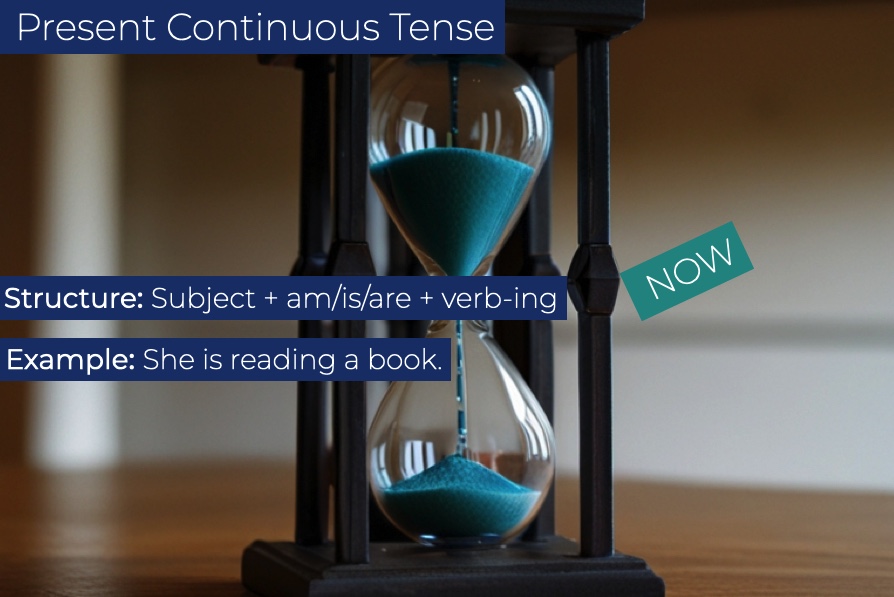The present continuous tense, also known as the present progressive tense, is used to describe actions that are happening right now or actions that are ongoing. It is an essential aspect of English grammar, helping to convey current activities, future plans, and temporary situations. Discover how it is used, when it is used, and some exercises to understand the usage.

What Is Present Continuous Tense?
The present continuous tense is formed using the present tense of the verb “to be” (am/is/are) followed by the base form of the main verb with an -ing ending. Unlike past simple tense, present continuous is about now.
How It Is Used
Affirmative Sentences
- Subject + am/is/are + verb-ing
- Example: She is reading a book.
Negative Sentences
Negative sentences are formed by adding “not” after the verb “to be.”
- Example: They are not (aren’t) watching TV.
Questions
Questions are formed by placing the verb “to be” before the subject.
- Example: Are you coming to the party?
When It Is Used
Actions Happening Now
The present continuous tense is used to describe actions that are happening at the moment of speaking.
- Example: I am writing a blog post right now.
Ongoing Actions
It is used for actions that are ongoing and not necessarily happening at the exact moment of speaking.
- Example: She is studying to become a doctor.
Future Plans
The present continuous tense can be used to talk about future plans or arrangements.
- Example: We are meeting them for dinner tonight.
Temporary Situations
It is also used to describe temporary actions or situations.
- Example: He is living with his parents until he finds a new apartment.
What’s your English level?
Discover your level now: A1/A2/B1/B2/C1/C2 and GET your certificate!
Examples of Present Continuous Tense
Affirmative Sentences
- They are playing soccer in the park.
- He is working on a new project.
Negative Sentences
- I am not (I’m not) going to the gym today.
- She is not (isn’t) feeling well.
Questions
- Are you watching the news?
- Is he coming to the meeting?
Present Continuous Tense Exercises
Convert the following sentences into the present continuous tense:
- She (write) ______ an email.
- They (not/eat) ______ dinner right now.
- He (watch) ______ a movie.
- (you/read) ______ this book?
- We (plan) ______ a trip to Japan.
Answers:
- She is writing an email.
- They are not (aren’t) eating dinner right now.
- He is watching a movie.
- Are you reading this book?
- We are planning a trip to Japan.
Understanding the present continuous tense is vital for effectively communicating actions that are happening now or will happen in the near future. By mastering its forms and uses, you can accurately describe ongoing activities, future plans, and temporary situations.





